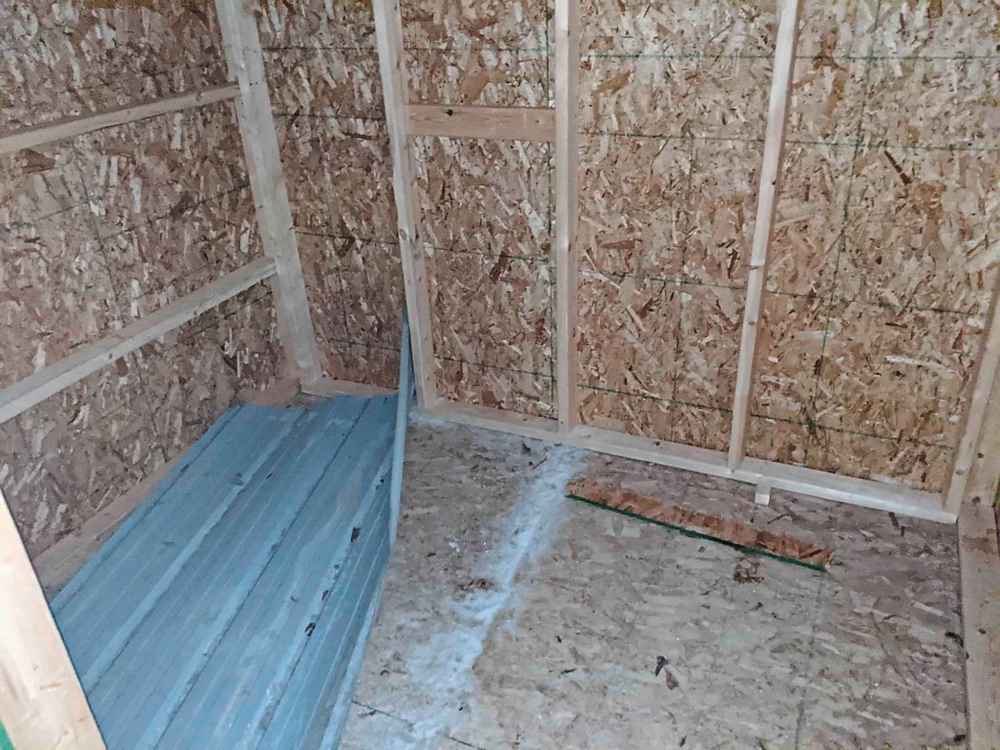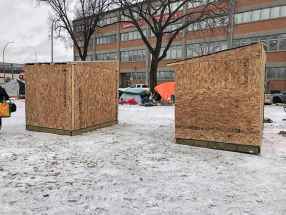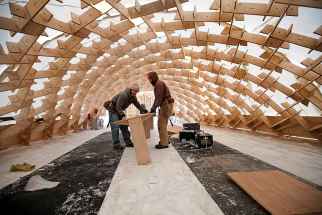Privately donated homeless warming sheds removed by city
Read this article for free:
or
Already have an account? Log in here »
To continue reading, please subscribe:
Monthly Digital Subscription
$0 for the first 4 weeks*
- Enjoy unlimited reading on winnipegfreepress.com
- Read the E-Edition, our digital replica newspaper
- Access News Break, our award-winning app
- Play interactive puzzles
*No charge for 4 weeks then price increases to the regular rate of $19.00 plus GST every four weeks. Offer available to new and qualified returning subscribers only. Cancel any time.
Monthly Digital Subscription
$4.75/week*
- Enjoy unlimited reading on winnipegfreepress.com
- Read the E-Edition, our digital replica newspaper
- Access News Break, our award-winning app
- Play interactive puzzles
*Billed as $19 plus GST every four weeks. Cancel any time.
To continue reading, please subscribe:
Add Free Press access to your Brandon Sun subscription for only an additional
$1 for the first 4 weeks*
*Your next subscription payment will increase by $1.00 and you will be charged $16.99 plus GST for four weeks. After four weeks, your payment will increase to $23.99 plus GST every four weeks.
Read unlimited articles for free today:
or
Already have an account? Log in here »
Hey there, time traveller!
This article was published 05/12/2019 (2195 days ago), so information in it may no longer be current.
Along the Disraeli Freeway, a stone’s throw from many of Winnipeg’s downtown homeless shelters and service centres, there is a parcel of greenspace covered by tents and other temporary shelters. It stands as evidence of the city’s deep-rooted poverty, high barriers to adequate housing, and that people living on the street often prefer to do so on their own terms.
Michael Belhumeur saw it, and along with the Urban Knights and Ladies Veterans Ambassador Peace Patrol, a volunteer group he founded in 1976, he wanted to do something about it.
Province re-ups with End Homelessness
On Thursday, the provincial government officially made a three-year investment in End Homelessness Winnipeg worth about $750,000.
The contribution is a renewal of a commitment the previous NDP government first made in 2015, which was carried over by the Conservatives when they won power the next year.
On Thursday, the provincial government officially made a three-year investment in End Homelessness Winnipeg worth about $750,000.
The contribution is a renewal of a commitment the previous NDP government first made in 2015, which was carried over by the Conservatives when they won power the next year.
End Homelessness chief executive officer Lucille Bruce said the funding being secured was essential toward the organization’s function and plans moving forward.
“End Homelessness Winnipeg has become one of the city’s most important leaders for co-ordinating homelessness funds and initiatives in Winnipeg,” Manitoba Families Minister Heather Stefanson said in a news release.
Despite its complex mandate, which includes major roles in the city’s extreme weather response steering committee, general city-wide homeless-related co-ordination, and advocating for developments such as 24-7 safe spaces and warming shelters, the organization runs on a relatively low annual budget of $850,000.
The remainder of its funding comes from the Winnipeg Regional Health Authority, United Way, and City of Winnipeg.
Bruce said she was relieved the provincial government re-upped its funding, given austerity measures enacted in other provincial jurisdictions in recent years. “We were so pleased the government has recognized this is one of the best investments they can make and the work is just starting toward collectively addressing homelessness,” she said.
As the organization’s role continues to develop, Bruce said the focus from now on needs to be on moving the entire sector away from managing homelessness and toward actually reducing it. End Homelessness is also involved in the dispersal of funds through the federal Reaching Home initiative to local organizations.
“Unless we deal with the root causes in a major way, homelessness isn’t going away,” she said.
Earlier this year, the organization enlisted a carpentry class at a high school in Stonewall to build a pair of warming huts, to be placed in Winnipeg where they might be of good use to homeless people, specifically veterans.
On Nov. 29, the two small, wooden huts (which were rudimentary: no insulation or windows) were erected near Disraeli Freeway. But within a few days, they were dismantled — Belhumeur says “destroyed” by heavy machinery without him being notified.
“I was absolutely distraught,” said Belhumeur, a military veteran himself.

The Winnipeg Police Service dismantled the warming huts over the weekend, citing violations to various city bylaws and regulations.
Police emailed photos of the huts the day they were erected to End Homelessness Winnipeg, an organization aimed at reducing homelessness and the effects of poverty in the city.
Like the police, upon seeing the huts, members of End Homelessness expressed concerns regarding the huts’ potential impact on the safety of those who might use them.
“Although it was probably well-intended, it’s not necessarily helping with the situation we’re trying to push forward with,” said Chrupalo, who also said police had tried to contact Belhumeur before and after the structures were put up.
Chrupalo said the huts presented liability issues, and could compromise the safety of people using them.
“We can’t have these two permanent shelters getting dropped off just because someone thinks it’s a good idea,” he said. “I get it, and I appreciate their intent, but there’s just a process for all of this to go through.”
Police reiterated no nearby tents nor their tenants were removed, and they have no plans to do so.
Lucille Bruce, chief executive officer of End Homelessness, said while it was clear the intentions were good and heart-felt, it would have been prudent for Belhumeur and his organization to contact the City of Winnipeg before going forward with the plan.

Since July, End Homelessness has been deputized as central co-ordinator in the city’s efforts to combat homelessness and address encampments, working alongside elected officials and community stakeholders to develop long-term strategies for both.
“We’re trying to work in a very co-ordinated and strategic fashion,” said Bruce, who said she would be open to meeting with Belhumeur in the future.
However, Belhumeur said he did reach out before going forward with the hut project, contacting End Homelessness, WPS, several city councillors, the mayor’s office, and a number of front-line organizations. Some gave assurances the huts would be well-received and placement wouldn’t violate any rules or regulations, he said.
“We can’t have these two permanent shelters getting dropped off just because someone thinks it’s a good idea. I get it, and I appreciate their intent, but there’s just a process for all of this to go through.” – WPS Sgt. Brian Chrupalo
Bruce said despite the miscommunication, the core idea of providing humane shelter in the form of “tiny” or “modular” structures is something her organization is researching as part of its five-year plan, along with housing options geared toward youth, LGBTTQ* community, and Indigenous people, and a co-ordinated access system for people seeking social or housing-related services.
Some cities have already adopted the “tiny house” or “tiny village” model for low-income housing, such as Edmonton, Ottawa and Calgary. In October, a village of 15, 275-square-foot homes built for veterans in the style of an army barracks were opened in Calgary. The roughly $5-million project was funded by Homes for Heroes, ATCO, and Mustard Seed, a Calgary-based poverty reduction agency, and features on-site counselling services.
The Urban Knights’ huts were built on a considerably smaller budget.
One more advanced hut was built for the group by Greenwald Hutterite Colony, featuring a bed and fixtures for electricity and plumbing. Belhumeur said he has plans to find a spot for it in the future, after going through proper channels.
Chrupalo said police are not be looking at any charges for violation of city bylaws.
For his part, Belhumeur understands the criticisms of the project, but is disappointed the huts were destroyed and the work of the students who built them barely had time to make an impact.
“There were practical motives for putting these huts down,” he said. “The huts were meant as a social justice statement, and we wanted them to reflect the compassion of the community, highlight the humanity of the homeless, and reflect the carnal neglect the city has imposed on the poor.
“It was meant to be a good thing.”
ben.waldman@freepress.mb.ca

Ben Waldman covers a little bit of everything for the Free Press.
Our newsroom depends on a growing audience of readers to power our journalism. If you are not a paid reader, please consider becoming a subscriber.
Our newsroom depends on its audience of readers to power our journalism. Thank you for your support.
History
Updated on Friday, December 6, 2019 9:43 AM CST: Updated.
Updated on Friday, December 6, 2019 10:46 AM CST: Updated
Updated on Friday, December 6, 2019 11:30 AM CST: Fixes grammar, typo
Updated on Friday, December 6, 2019 2:32 PM CST: Clarifies timeline of huts' removal.














.jpg?h=215)
